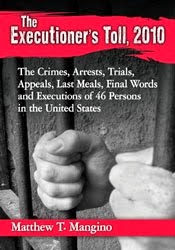Youngstown Vindicator
Sunday, June 6, 2010
In 1966, the Supreme Court of the United States decided Miranda v. Arizona. The Court ruled that all persons held by the police for purposes of interrogation must be informed of certain rights. Those rights, now simply referred to as Miranda, are arguably the best known words from any court case in American history, “You have the right to remain silent, anything you say can and will be used against you, you have the right to an attorney, if you can’t afford one, one will be appointed for you.”
Last week, the Supreme Court handed down its third ruling this year interpreting the nuances of Miranda. Last week’s opinion, Berghuis v. Thompkins, held that, “A suspect who has received and understood the Miranda warnings, and has not invoked the Miranda rights, waives the right to remain silent by making an uncoerced statement to the police.”
Van Chester Thompkins was a suspect in a murder that occurred outside a Southfield, Mich., strip mall. When the police brought him in for questioning he was advised of his right to remain silent and his right to legal counsel. He remained mostly silent for nearly three hours. As a result he failed to articulate with precision that he did not want to talk to the police.
The police continued to question Thompkins. After three hours he was asked, “Do you pray to God to forgive you for shooting that boy down?” Thompkins answered, “Yes.” The statement was used against him at trial.
Justice Anthony M. Kennedy wrote on behalf of a 5 to 4 majority, “If Thompkins wanted to remain silent, he could have said nothing in response to [the] questions, or he could have unambiguously invoked his Miranda rights and ended the interrogation.”
The Court made it clear that anything short of an unequivocal response either waiving or invoking the right to silence, or counsel, will not be sufficient. Silence itself is not enough to claim the right to remain silent.
Justice Sonia Sotomayor, wrote a dissenting opinion taking issue with the majority, “Criminal suspects must now unambiguously invoke their right to remain silent, which, counterintuitively, requires them to speak.”
Confession
Thompkins is the third government-friendly Miranda decision by the Supreme Court in 2010. In Florida v. Powell, decided in February, Kevin Powell was taken into custody during a robbery investigation. A gun was later found in his girlfriend’s apartment. Powell was prohibited from possessing a firearm due to his history of felony convictions. After he was told by police that he had, “The right to a lawyer before answering any of our questions,” he confessed, without counsel, to having the gun.
Powell’s confession was suppressed by the trial court because the police were not precise in administering the Miranda warnings. The appellant court agreed. The U.S. Supreme Court disagreed. In an opinion written for a 7-2 majority, Justice Ruth Bader Ginsburg wrote, “The four warnings Miranda requires are invariable, but this court has not dictated the words in which the essential information must be conveyed.” Essentially, Miranda warnings need not be precise.
In Maryland v. Shatzer, decided a day before Powell, Michael Shatzer was in prison when the police questioned him about the sexual assault of his son. After being read his Miranda warnings he invoked his right to legal counsel and the interrogation was terminated. Thirty-months later the police returned to interview him. Shatzer was, again, Mirandized and confessed to assaulting his son. Shatzer’s confession was used to convict him of sexual assault.
Justice Antonin Scalia wrote in Shatzer, there should not be an “eternal” bar against further police questioning after a suspect requested an attorney. The 30-month break in custody was enough. However, Scalia went further. Those suspects, who have been released from custodial interrogation for at least 14 days, could be returned to custody and if they did not again invoke counsel, could be interrogated and any incriminating statement could be used at trial.
In four months, the U.S. Supreme Court has held that an accused must be precise; the police need not use precision and an accused, once precise, may indeed need to be precise once more. Police officers and prosecutors must be tickled by the evolution of a 45-year-old ruling touted as one of the 20th century’s most significant criminal justice decisions.
The G E Mound Case
2 months ago








No comments:
Post a Comment